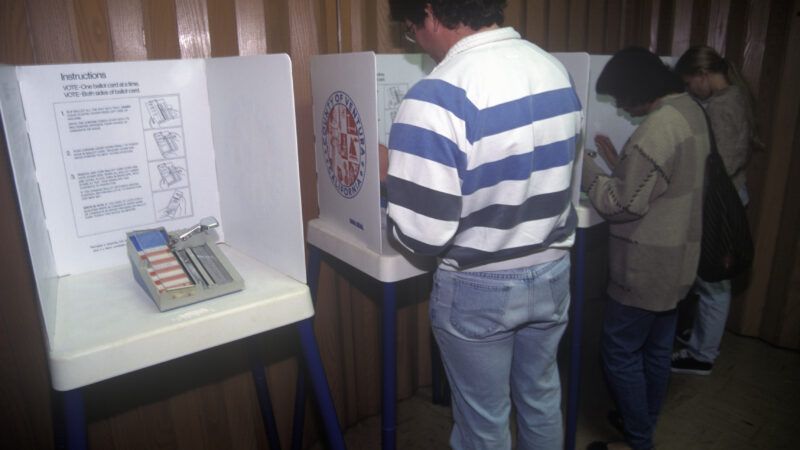The Battle of the Sexes Turns Political
Political polarization poisons yet another area of life.

Political polarization and the acceleration thereof have been headline-grabbers for years, and the so-called battle of the sexes is of much older vintage. But what happens when you blend the two into a growing partisan divide between men and women? Well, you end up with warnings that the sexes are diverging in their politics, with all that implies—whatever that might be.
You are reading The Rattler from J.D. Tuccille and Reason. Get more of J.D.'s commentary on government overreach and threats to everyday liberty.
Political Battle of the Sexes
"In countries on every continent, an ideological gap has opened up between young men and women," writes John Burn-Murdoch at the Financial Times. "Tens of millions of people who occupy the same cities, workplaces, classrooms and even homes no longer see eye-to-eye."
Burn-Murdoch highlights data from South Korea, the U.S., Germany, and the U.K. In each country, women are swerving left while men are tending right. In the U.S., Germany, and the U.K., women's leftward swing is most pronounced, while in South Korea the larger movement is among men becoming more conservative.
"In the US, Gallup data shows that after decades where the sexes were each spread roughly equally across liberal and conservative world views, women aged 18 to 30 are now 30 percentage points more liberal than their male contemporaries," notes Burn-Murdoch. "That gap took just six years to open up."
In the U.S., men's opinions drifted left about 10 years ago before moving back to the center. The biggest change has been the leftward surge among women, echoed in other countries.
Diverging political opinions between the sexes were called out earlier, by Jean Twenge, who wrote in her 2023 book Generations: "Among liberals, the future is female, and among conservatives, the future is male."
Guys May Be Conscientious Objectors
Twenge's conclusions were challenged by, among others, Daniel Cox of the American Survey Center. He agreed that young women are trending liberal, but that young men currently look more moderate or politically noncommittal than conservative.
"One important reason the politics of young men is so difficult to pin down is that so few have participated in institutions that shape their values and help them identify their purposes," Cox added. "Young men may also take longer to define themselves because masculinity itself can be difficult to define in modern culture. It's frequently treated as a pejorative, but it's a quality many young men still aspire to."
With the left, in recent years, harping on "toxic masculinity" while conservatives promote traditional male characteristics, it's no wonder that attitudes towards masculinity have become predictors of political affiliation in the U.S. But a similar divergence in politics seems to be taking place in other countries.
Alice Evans, a gender researcher and visiting fellow at Stanford University, attributes the political divergence along sexual lines to economic and cultural frustrations, less mixed socializing, and self-aggrandizing "influencers" playing on gender differences for personal gain.
Separate Communities Growing Apart
In the West, older men and women tend to have similar views because "they came of age at a time of shared cultural production and mixed gendered socialising," she writes. "But now – in economically developed and culturally liberal societies – young men and women seem to be growing apart. Evidence points to economic frustrations, social media filter bubbles and cultural entrepreneurs."
"Failure to address this gap may impede heterosexual love, friendships and family formation," Evans cautions. She suggests the divide might be bridged by growing prosperity, bursting social-media bubbles, and cross-gender friendships.
Cultural attitudes and economic shifts are very real and can certainly drive resentment as some groups lose status or are flat-out denigrated. Psychologist Helen Smith wrote the 2014 book, Men on Strike, about male reactions to a "system that seems to be increasingly stacked against them."
Segregated communities also tend to be self-reinforcing. We've seen that as Republicans/conservatives and Democrats/liberals geographically relocate themselves to like-minded communities where people share the same viewpoints.
"America is growing more geographically polarized — red ZIP codes are getting redder and blue ZIP codes are becoming bluer. People appear to be sorting," NPR noted in 2022.
"Groups of like-minded people tend to become more extreme over time in the way that they're like-minded," commented Bill Bishop, who wrote about the phenomenon in 2008's The Big Sort.
If young men and women aren't socializing together to the same extent as their parents and grandparents, but are discussing politics and other important issues in separate communities, they may drive already conflicting views farther apart.
Policy Preferences May Not Match Partisan Differences
But how far apart are men and women, really? It's one thing to say that women are veering to the left and men to the right, but what does that mean? The answer is: It sort of depends.
Ohio State political scientist Tom Wood found that, when you compare answers to questions on specific policies such as gun control, abortion, and taxes, women do indeed come off as more to the left than men. But when you compare the differences in the answers, as Jan Zilinsky of the Technical University of Munich did, on most issues the policy gap isn't that big.
Are policy preferences more important than political tribe identity? That's something of an open question, though recent experience in the U.S. suggests that tribal identity is very important. Burn-Murdoch of the Financial Times points to diverging voting patterns between men and women, which can have big consequences no matter what people prefer on specific issues.
"It would be easy to say this is all a phase that will pass, but the ideology gaps are only growing, and data shows that people's formative political experiences are hard to shake off," adds Burn-Murdoch.
At a moment when political differences already seep into everyday life and ruin everything, perhaps we shouldn't be surprised that relations between the sexes are also falling victim.


Show Comments (152)